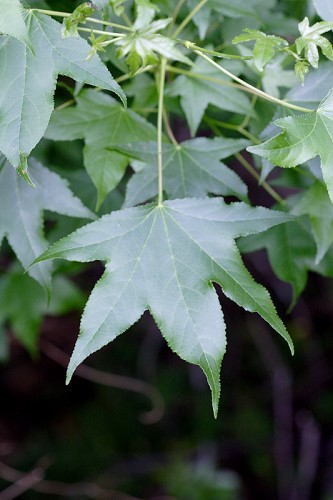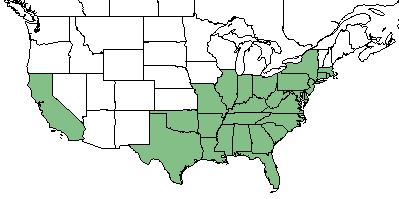Difference between revisions of "Liquidambar styraciflua"
(→Distribution) |
|||
| Line 31: | Line 31: | ||
==Ecology== | ==Ecology== | ||
===Habitat=== <!--Natural communities, human disturbed habitats, topography, hydrology, soils, light, fire regime requirements for removal of competition, etc.--> | ===Habitat=== <!--Natural communities, human disturbed habitats, topography, hydrology, soils, light, fire regime requirements for removal of competition, etc.--> | ||
| − | < | + | ''L. styraciflua'' is found in swamp forests, floodplains, moist forests, depressional wetlands, old fields, and disturbed areas. <ref name= "Weakley 2015"> Weakley, A. S. (2015). Flora of the Southern and Mid-Atlantic States. Chapel Hill, NC, University of North Carolina Herbarium. </ref> |
| + | ===Phenology=== <!--Timing off flowering, fruiting, seed dispersal, and environmental triggers. Cite PanFlora website if appropriate: http://www.gilnelson.com/PanFlora/ --> | ||
| + | ''L. styraciflua'' flowers February, March, and May. <ref name= "PanFlora"> PanFlora Author: Gil Nelson URL: [http://www.gilnelson.com/PanFlora/ http://www.gilnelson.com/PanFlora/] Date Accessed: 5/24/18 </ref> | ||
<!--===Seed dispersal===--> | <!--===Seed dispersal===--> | ||
<!--===Seed bank and germination===--> | <!--===Seed bank and germination===--> | ||
| − | + | ===Fire ecology=== <!--Fire tolerance, fire dependence, adaptive fire responses--> | |
| + | ''L. styraciflua'' is not fire resistant and has low fire tolerance. <ref name= "USDA Plant Database"/> | ||
<!--===Pollination===--> | <!--===Pollination===--> | ||
| − | + | ===Use by animals=== <!--Herbivory, granivory, insect hosting, etc.--> | |
| + | ''L. styraciflua'' has medium palatability for browsing animals, and the bark is a favorite food of beavers. Additionally, the sap used to be gathered as chewing gum. <ref name= "Weakley 2015"/> | ||
<!--==Diseases and parasites==--> | <!--==Diseases and parasites==--> | ||
Revision as of 09:37, 24 May 2018
| Liquidambar styraciflua | |
|---|---|

| |
| Photo by the Southeastern Flora Database | |
| Scientific classification | |
| Kingdom: | Plantae |
| Division: | Magnoliophyta - Flowering plants |
| Class: | Magnoliopsida - Dicots |
| Order: | Hamamelidales |
| Family: | Hamamelidaceae |
| Genus: | Liquidambar |
| Species: | L. styraciflua |
| Binomial name | |
| Liquidambar styraciflua L. | |

| |
| Natural range of Liquidambar styraciflua from USDA NRCS Plants Database. | |
Contents
Taxonomic Notes
Synonyms: none
Varieties: none
Description
L. styraciflua is a perennial tree of the Hamamelidaceae family native to North America. [1]
Distribution
L. styraciflua is found in the southeastern corner of the United States from Texas to Massachusetts, as well as California. [1]
Ecology
Habitat
L. styraciflua is found in swamp forests, floodplains, moist forests, depressional wetlands, old fields, and disturbed areas. [2]
Phenology
L. styraciflua flowers February, March, and May. [3]
Fire ecology
L. styraciflua is not fire resistant and has low fire tolerance. [1]
Use by animals
L. styraciflua has medium palatability for browsing animals, and the bark is a favorite food of beavers. Additionally, the sap used to be gathered as chewing gum. [2]
Conservation and Management
Cultivation and restoration
Photo Gallery
References and notes
- ↑ 1.0 1.1 1.2 USDA Plant Database https://plants.usda.gov/core/profile?symbol=LIST2
- ↑ 2.0 2.1 Weakley, A. S. (2015). Flora of the Southern and Mid-Atlantic States. Chapel Hill, NC, University of North Carolina Herbarium.
- ↑ PanFlora Author: Gil Nelson URL: http://www.gilnelson.com/PanFlora/ Date Accessed: 5/24/18